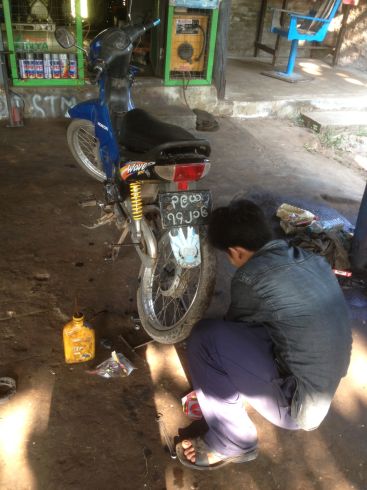Maturity of teams working on data
The way towards continuous processing

- Everyone in the team must have a good workstation
- Use version control
- Script the whole workflow from scratch
- Tests should be automatic too
- Don't update data, augment it !
- Use a build system for your data
- Continuous processing is like refill
Agenda
Everyone in the team must have a good workstation
- a good internet connection
- a lot of RAM and (fast) disk
- a scriptable command line
- ... for every team member, even testers !
Would you repair this ?

in here ?

Use version control
- eg : git
- even for a hackathon !
- commit your doc
Script the whole workflow from scratch
How many city per departement ?
.mode tabs
.import comsimp2015.txt city
.import depts2015.txt departement
CREATE INDEX idx_city on city (DEP, COM);
CREATE INDEX idx_dept on departement (DEP);
.mode csv
.output result.csv
SELECT departement.DEP, departement.NCCENR AS DEP_NAME, COUNT(*)
FROM departement
JOIN city ON city.DEP = departement.DEP
GROUP BY departement.DEP, departement.NCCENR;
How many city per departement ?
What will happen if there is an error in the second index ?
set -e
wget http://www.insee.fr/fr/methodes/nomenclatures/cog/telechargement/2015/txt/depts2015.txt
wget http://www.insee.fr/fr/methodes/nomenclatures/cog/telechargement/2015/txt/comsimp2015.zip
unzip comsimp2015.zip
sqlite3 cities.sqlite <<$script$
.headers ON
.mode tabs
.import comsimp2015.txt city
.import depts2015.txt departement
CREATE INDEX idx_city on city (DEP, COM);
CREATE INDEX idx_dept on city (DEP); -- <-- error here
.mode csv
.output result.csv
SELECT departement.DEP, departement.NCCENR AS DEP_NAME, COUNT(*)
FROM departement
JOIN city ON city.DEP = departement.DEP
GROUP BY departement.DEP, departement.NCCENR;
$script$
How to deal with errors ?
-
3 ways to re-run what have failed :
- Comment the sources
- Reset everything before you start
- Run each step under condition
Comment the part that have already run - DON'T !
set -e
# wget http://www.insee.fr/fr/methodes/nomenclatures/cog/telechargement/2015/txt/depts2015.txt
# wget http://www.insee.fr/fr/methodes/nomenclatures/cog/telechargement/2015/txt/comsimp2015.zip
# unzip comsimp2015.zip
sqlite3 cities.sqlite <<$script$
.headers ON
.mode tabs
-- .import comsimp2015.txt city
-- .import depts2015.txt departement
-- CREATE INDEX idx_city on city (DEP, COM);
CREATE INDEX idx_dept on departement (DEP);
.mode csv
.output result.csv
SELECT departement.DEP, departement.NCCENR AS DEP_NAME, COUNT(*)
FROM departement
JOIN city ON city.DEP = departement.DEP
GROUP BY departement.DEP, departement.NCCENR;
$script$
Reset everything before you start - Painfull
rm cities.sqlite
rm depts2015.txt
rm comsimp2015.zip
set -e
wget http://www.insee.fr/fr/methodes/nomenclatures/cog/telechargement/2015/txt/depts2015.txt
wget http://www.insee.fr/fr/methodes/nomenclatures/cog/telechargement/2015/txt/comsimp2015.zip
unzip comsimp2015.zip
sqlite3 cities.sqlite <<$script$
.headers ON
.mode tabs
.import comsimp2015.txt city
.import depts2015.txt departement
CREATE INDEX idx_city on city (DEP, COM);
CREATE INDEX idx_dept on departement (DEP);
.mode csv
.output result.csv
SELECT departement.DEP, departement.NCCENR AS DEP_NAME, COUNT(*)
FROM departement
JOIN city ON city.DEP = departement.DEP
GROUP BY departement.DEP, departement.NCCENR;
$script$
Conditional execution
set -e
if [ ! -e depts2015.txt ]; then
curl -O "http://www.insee.fr/fr/methodes/nomenclatures/cog/telechargement/2015/txt/depts2015.txt"
fi
if [ ! -f comsimp2015.zip ]; then
curl -O "http://www.insee.fr/fr/methodes/nomenclatures/cog/telechargement/2015/txt/comsimp2015.zip"
fi
if [ ! -f comsimp2015.txt ]; then
unzip comsimp2015.zip
fi
if ! echo "SELECT * FROM city LIMIT 0;" | sqlite3 cities.sqlite 2> /dev/null ; then
sqlite3 cities.sqlite <<$script$
.mode tabs
.import comsimp2015.txt city
CREATE INDEX idx_city on city (DEP, COM);
$script$
fi
if ! echo "SELECT * FROM departement LIMIT 0;" | sqlite3 cities.sqlite 2> /dev/null ; then
sqlite3 cities.sqlite <<$script$
.mode tabs
.import depts2015.txt departement
CREATE INDEX idx_dept on departement (DEP);
$script$
fi
if [ ! -f result.csv ]; then
sqlite3 cities.sqlite <<$script$
.headers ON
.mode csv
.output result.csv
SELECT departement.DEP, departement.NCCENR AS DEP_NAME, COUNT(*)
FROM departement
JOIN city ON city.DEP = departement.DEP
GROUP BY departement.DEP, departement.NCCENR;
$script$
fi
Forces to structure the code around chunks of data
Tests should be automatic too
- test existence
- test quantities
- test integration
- be creative !
Example : test quantities (and existance)
if ! echo "SELECT * FROM departement LIMIT 0;" | sqlite3 cities.sqlite 2> /dev/null ; then
sqlite3 cities.sqlite <<$script$
.mode tabs
.import depts2015.txt departement
CREATE INDEX idx_dept on departement (DEP);
$script$
NB_DEPS=`echo "SELECT COUNT(*) FROM departement;" | sqlite3 cities.sqlite`
if [ $NB_DEPS -lt 100 ] ; then
echo "More than 100 departement expected but $NB_DEPS found"
exit 1
fi
fi
Don't update data, augment it !
- Example with files and SQL
- How much disk is worth an hour of your time ?
It's worth duplicating some data if you get rollback
Example : INSEE code for each city
ALTER TABLE city ADD COLUMN INSEE;
UPDATE city SET INSEE = DEP || COM;
CREATE TABLE city_insee AS
SELECT *, DEP || COM AS INSEE FROM city;
How much space is worth your time ?
A developer cost at least 200 € a day
A 240 GB SSD costs 60 €
1h <==> 100 GB !
You can spend a lot of space to same time... Don't hesitate to duplicate data if you trade it with rollback !
Use a build system for your data
- collaboration gets automatic
- eg : make, Drake, ex-continuous-processing or tuttle
- focus on tuttle
Continuous processing
- Update the data as soon as a team member commits a change in code
- Update the data when source data changes
- Can be operated by tools like Jenkins
It's is like your phone battery !
- The normal state is when every process is complete
- Reprocess what have changed as soon as you can
- You should never have to reprocess all... Unless there is a major issue
- It will have an impact on how you structure your project
Conclusion : Improve continuously
- software engineering is a good source of inspiration...
- ... like agile methods
- retrospectives helps your team find your its ways of improvement
